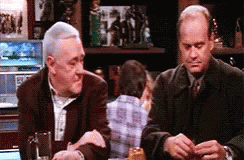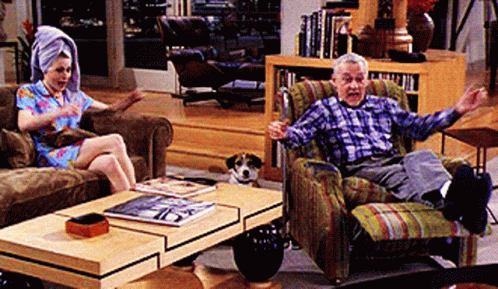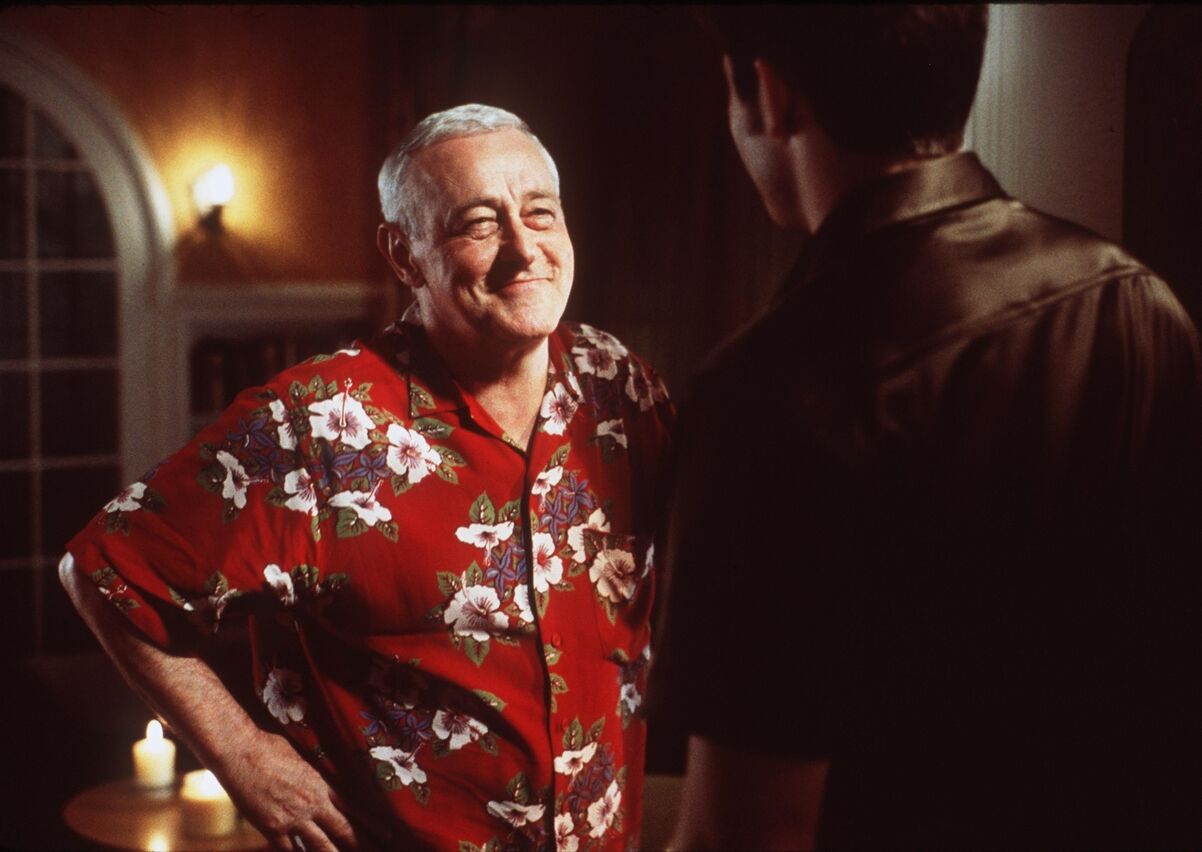With many legendary public figures of bygone eras, their queer identities are often kept secret until after their deaths. After all, it was only after Whitney Houston tragically passed on that her family and friends would speak about her relationship with Robyn Crawford. A similar scenario befell Luther Vandross. And now, the media is giving John Mahoney the same treatment.
Perhaps it’s because these celebrities lived in the open, and with such open secrets, that we feel ownership over their membership to our queer club. Call it a kinship, an understanding, in which we empathize over their inability to be their full selves. The fears and internalized homophobia are a shared sentiment of sorts, even for those of us who have been able to come out and live our fully-realized queer lives.
Mahoney’s part of the “family”

I remember how I first learned that John Mahoney was family. Growing up, I regularly watched Frasier with my dad. We enjoyed Mahoney’s hilarious performance as the sports-loving father to two decidedly unathletic sons, Frasier and Niles. When I moved to Chicago, Mahoney was a local celebrity, often playing at the Steppenwolf Theatre. Perhaps someone who worked with him there passed along that he was gay. I never remember it being treated as a secret, especially when his on-screen son, David Hyde Pierce, came out. Articles touting how gay the cast of Frasier was and had always included Mahoney in them.
But when news of Mahoney’s death came over the weekend, it was shocking to see that his obituaries were devoid of any mention of his being openly gay. That’s when I discovered, along with many others, that he may have lived as a gay man in his private life, but he had never publicly come out.
Mahoney’s queer roles
At 77, Mahoney’s untimely death was due to throat cancer. Still, he is remembered for several high-profile and memorable roles outside Martin Crane. Notably, he played a gay man (and former drag queen) named Bennett on a 2006 episode of E.R., who comes to the hospital when his partner, James, has heart trouble. As James’ condition worsens, his family attempts to ignore Bennett’s place in his life, as the men spent 15 years together.
After James dies, Bennett delivers a passionate speech that Mahoney, a seasoned actor of both comedy and drama, nails:
“As bad as it all may sound, I belong to a rare tribe constitutionally incapable of giving up on fantasy. If I can get up like a lady and sell a torch song to a crowd then I sure as hell can hold onto the hope that maybe, somehow Jimmy’s gonna be okay. We are all liars, just like they said. The makeup, the wig, the padded dress. All a beautiful lie we tell ourselves. But it makes us feel better.”
Not going to lie, it’s a riveting hour of TV.
The Broken Hearts Club and John’s sexuality
Mahoney also played a pivotal gay role in Greg Berlanti’s 2000 GLAAD-Award-winning film The Broken Hearts Club: A Romantic Comedy.
Boasting an all-star cast from Timothy Olyphant to Justin Theroux, the film had Mahoney as a West Hollywood restaurant owner and followed the softball team he not only sponsored but often dished out dinner and advice to.
“Everyone can’t be straight. Everyone can’t be beautiful. Everyone can’t be the same, Patrick. Some people are just gay and average. We’re the strongest, I think.”
A quote from John Mahoney’s character Jack in The Broken Hearts Club: A Romantic Comedy
But despite his characters delivering such affirming dialogue, Mahoney was not interested in coming out in the press. His infrequent interviews would entirely avoid the question of a love life, save for a few. In a 2015 Time Out Chicago interview, he was asked if there was a chance of a “partner or romantic life” for him.
“Yeah, it doesn’t exist for me anymore. [Laughs] I think that’s dead and buried,” Mahoney said. “Twenty-three years ago I had cancer of the colon. I had to have major surgery, and I have a colostomy. I really couldn’t have sex after that. I’m very happy by myself and with my friends, but no, I’m definitely not involved with anybody. Nor do I ever look to be.”
Gay after death?
Still, remembrances of Mahoney are populated with his being gay. And some are incensed by this detail being left out of the mainstream media’s obits for the actor. Some commenters even maintain he had a partner who was being ignored. But with Mahoney looking to keep his homosexuality out of the press, it’s hard to celebrate him without also feeling like he’s being outed. As is always the case with closeted celebrities.
Still, society has become more accepting. Gay people have been more visible, and many would argue that Mahoney should feel comfortable coming out in the public eye. That playing gay roles, appearing in public with his partner, and living in a liberal metropolis like Chicago would afford him a comfortability with himself. That we see him as lacking without his public affirmation.
I offer another quote from Broken Hearts Club:
“Sometimes I wonder what you boys would do if you weren’t gays. You’d have no identity. It was easy when you couldn’t talk about it. Now it’s all you talk about. You talk about it so much that you forget about all the other things that you are.”
A quote from John Mahoney’s character Jack in The Broken Hearts Club: A Romantic Comedy
Maybe that’s what Mahoney was afraid of: being defined by his homosexuality. So many of us believe that it would be wrong that our obsessions with our gay identities don’t define us any more than anything else. Instead, we find the specificities of being gay or lesbian or bi or trans something worth investigating and owning.
But the major difference: when we claim our identity, it’s on our own terms. Like the younger men of the Broken Hearts Club learned, it’s easier to embrace that kind of ownership out loud. That might not have been the case for John Mahoney. Still, we can’t keep him in the closet forever because of it.
Wrap-up

Despite all this, the New York Times or Hollywood Reporter will say Mahoney was never married and had no children. The assumptions he is heterosexual because he never said otherwise. Still, we can still celebrate him as having claimed a space not so different from other queer actors in history. Suppose he’s savoring his spot next to Anthony Perkins, Rock Hudson, or James Dean, listening to a beautiful duet from Whitney Houston and Luther Vandross, accompanied by Liberace at a gorgeous gay bar atop a rainbow in the sky.
I don’t know if John Mahoney was ashamed of his sexuality or if he would choose the word “gay” as an identifier. But by all accounts from those who seem to have known him well, he was one of us, and that’s worth acknowledging.
Related:
Buffy, Sailor Moon and Queering Media
Before ‘Glee’, queer people weren’t fully represented in television. However we found parts of ourselves in shows like ‘Buffy the Vampire Slayer’, and others, when it mattered most.
5 Meryl Streep Roles That Queer People Love
To celebrate acting icon Meryl Streep, take a walk down memory lane with some of her roles that have won the hearts of the queer community.
Where to Start with the Queer Cinematic Canon
If you’re wondering where to start, here’s a list of essential docs and feature films to watch that will get you broadly up to speed.
Ready for the freshest LGBTQ+ news scoop? Subscribe to the IntoMore newsletter, where we spill the tea on who’s out of the closet and who’s still snug inside.
Don't forget to share:
Help make sure LGBTQ+ stories are being told...
We can't rely on mainstream media to tell our stories. That's why we don't lock our articles behind a paywall. Will you support our mission with a contribution today?
Cancel anytime · Proudly LGBTQ+ owned and operated
Read More in Culture
The Latest on INTO
Subscribe to get a twice-weekly dose of queer news, updates, and insights from the INTO team.
in Your Inbox
















